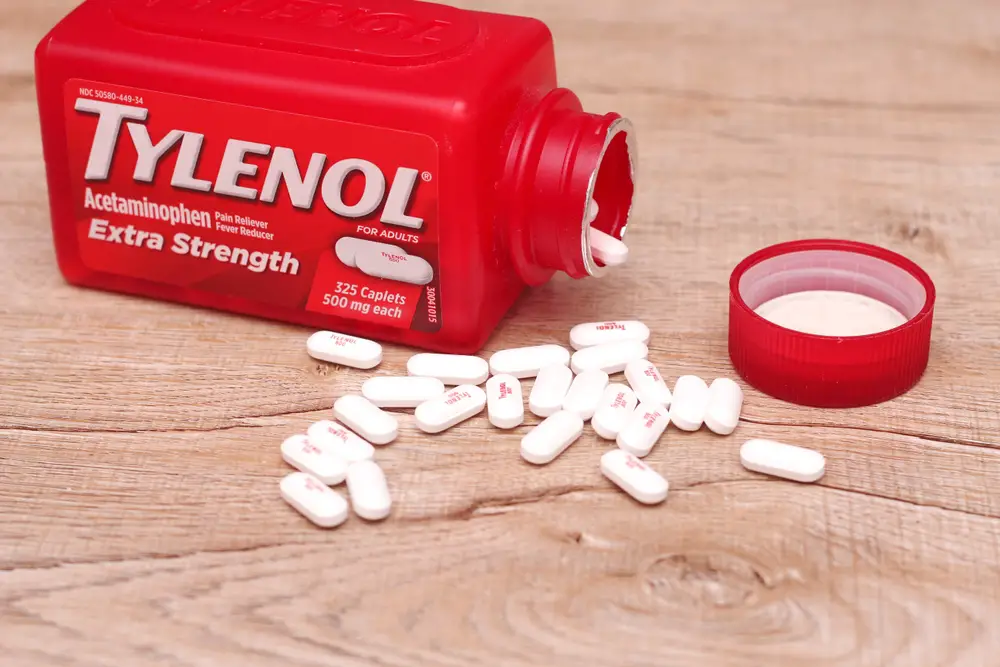If you’re a parent or caregiver, you know that teething can be a difficult time for babies. The pain and discomfort can make them fussy, irritable, and restless. As a result, you may be wondering when it’s appropriate to give your baby Tylenol to help ease the teething pain.
According to the makers of Tylenol, it’s recommended that parents talk with their child’s doctor about medicating kids under 2 years old. However, over-the-counter pain medications such as acetaminophen (Tylenol) or ibuprofen (Advil, Motrin) can be given to infants and children to help relieve teething pain. It’s important to follow the recommended dosage based on your child’s age and weight, and to avoid giving them too much or too often.
It’s also important to note that there are other remedies you can try before resorting to medication. For example, you can give your baby something cold to chew on, such as a chilled teething ring or a damp washcloth. You can also gently massage their gums with a clean finger or offer them soft foods to eat. Of course, every baby is different, so it’s important to find what works best for your little one.
Understanding Teething
Teething is a natural process that occurs when your baby’s teeth start to emerge from their gums. This process usually starts around 6 months of age, but it can begin as early as 3 months or as late as 12 months. It can take up to 2 years for all of your baby’s teeth to come in.
During teething, your baby may experience discomfort and pain in their gums. This can cause them to be fussy, irritable, and quick to cry. Your baby may also drool more than usual, and you may notice that they want to chew on things to relieve their discomfort.
It’s important to note that teething can cause some mild symptoms, but it should not cause a fever or other serious symptoms. If your baby has a fever or other symptoms, it’s important to contact your pediatrician.
To help your baby through the teething process, you can provide them with safe and effective remedies such as teething rings, cold washcloths, and gentle gum massages. You can also consider giving them over-the-counter pain medications such as acetaminophen (Tylenol) or ibuprofen (Advil) if their discomfort is severe.
It’s important to follow the recommended dosage guidelines for these medications, as giving your baby too much can be harmful. Always consult with your pediatrician before giving your baby any medication, and never give them aspirin, as it can cause a rare but serious condition called Reye’s syndrome.
In summary, teething is a natural process that can cause discomfort for your baby. By understanding the symptoms and safe remedies, you can help your baby through this process and provide them with the relief they need.
What is Tylenol?
Tylenol is a brand name for acetaminophen, a common pain reliever and fever reducer. It is a popular over-the-counter medication used to relieve pain and reduce fever in adults and children. Tylenol is often used to treat teething pain in babies and toddlers.
Acetaminophen works by blocking the production of certain chemicals in the brain that cause pain and fever. It is generally considered safe when used as directed, but it can have serious side effects if taken in large doses or for extended periods of time.
Tylenol comes in many different forms, including tablets, capsules, liquid, and chewable tablets. It is important to choose the right form and dose based on your child’s age and weight.
Always read the label carefully and follow the dosing instructions provided. Do not exceed the recommended dose or give Tylenol more frequently than directed. If you have any questions or concerns about using Tylenol for teething or any other purpose, talk to your doctor or pharmacist.
Signs Your Baby May Need Tylenol

Teething can be a challenging time for both you and your baby. As your little one’s first teeth begin to emerge, they may experience discomfort and pain. While some babies may handle teething without any issues, others may need some extra help to manage their pain. Here are some signs that your baby may need Tylenol for teething:
- Your baby is crying more than usual: If your baby is crying more than usual and seems inconsolable, it could be a sign that they are in pain. Teething can cause discomfort and pain, which can lead to fussiness and crying.
- Your baby is drooling excessively: Excessive drooling is a common sign of teething. While drooling is not necessarily a cause for concern, it can lead to skin irritation and rashes around your baby’s mouth.
- Your baby is biting or chewing on everything: As their teeth begin to emerge, babies may feel the need to bite or chew on things to help relieve their discomfort. If your baby is chewing on everything in sight, it could be a sign that they are in pain.
- Your baby has trouble sleeping: Teething pain can make it difficult for your baby to fall asleep or stay asleep. If your baby is having trouble sleeping, it could be a sign that they are in pain.
If your baby is experiencing any of these signs, Tylenol may be able to help relieve their discomfort. However, it is important to speak to your pediatrician before giving your baby any medication. Your pediatrician can help you determine the appropriate dosage and frequency of Tylenol for your baby.
When to Give Tylenol for Teething
If your baby is experiencing teething pain, you may be wondering when it is appropriate to give them Tylenol. Here are some situations in which giving Tylenol may be necessary:
During Excessive Drooling
Teething can cause excessive drooling, which can lead to skin irritation and rashes around the mouth and chin. If your baby is experiencing discomfort due to excessive drooling, you may consider giving them Tylenol to help ease the pain.
When Sleep is Disturbed
Teething pain can often disrupt a baby’s sleep, causing them to wake up frequently during the night. If your baby is having trouble sleeping due to teething pain, giving them Tylenol before bedtime may help them sleep more soundly.
Upon Pediatrician’s Advice
If your baby is experiencing severe teething pain, your pediatrician may recommend giving them Tylenol to help manage the discomfort. Always consult with your pediatrician before giving your baby any medication.
When giving Tylenol to your baby, make sure to follow the recommended dosage instructions based on their age and weight. It is also important to avoid giving your baby too much Tylenol, as this can be harmful. If you have any concerns about giving your baby Tylenol, consult with your pediatrician.
How to Administer Tylenol

When it comes to giving your child Tylenol for teething pain, it’s important to follow the recommended dosage guidelines to ensure their safety. Here are some tips on how to properly administer Tylenol:
1. Check the dosage chart
Before giving your child Tylenol, check the dosage chart to determine the appropriate amount based on their weight and age. You can find this information on the packaging or by consulting with your pediatrician.
2. Use the correct measuring device
It’s important to use the correct measuring device when giving your child Tylenol. This can be a syringe, dropper, or measuring cup. Do not use a household spoon as it may not provide an accurate measurement.
3. Give with food or milk
Tylenol can be given with or without food, but giving it with food or milk can help prevent stomach upset. Avoid giving it on an empty stomach.
4. Wait before giving another dose
It’s important to wait the recommended amount of time before giving another dose of Tylenol. This is typically 4-6 hours for infants and children over 2 years old, and 2-3 hours for infants under 2 years old.
5. Store properly
Store Tylenol in a cool, dry place and out of reach of children. Check the expiration date before giving it to your child and discard any expired medication.
By following these tips, you can safely and effectively administer Tylenol to your child for teething pain relief. Remember to always consult with your pediatrician before giving any medication to your child.
Possible Side Effects of Tylenol
While Tylenol is generally safe and effective for relieving teething pain in babies and young children, it is important to be aware of the possible side effects of this medication. Here are some things to keep in mind:
Allergic Reactions
Some children may be allergic to Tylenol, so it’s important to watch for signs of an allergic reaction, such as:
- Hives
- Rash
- Itching
- Swelling of the face, tongue, or throat
- Difficulty breathing
If your child experiences any of these symptoms after taking Tylenol, stop giving the medication and seek medical attention right away.
Liver Damage
While Tylenol is safe when used as directed, taking too much of this medication can cause liver damage. This is especially true if your child has liver disease or is taking other medications that can affect the liver.
To avoid liver damage, be sure to follow the dosing instructions carefully and never give your child more than the recommended amount of Tylenol. If your child has liver disease or is taking other medications, talk to your doctor before giving them Tylenol.
Other Side Effects
In addition to allergic reactions and liver damage, Tylenol can also cause other side effects, such as:
- Nausea
- Vomiting
- Diarrhea
- Stomach pain
If your child experiences any of these symptoms after taking Tylenol, stop giving the medication and talk to your doctor.
Overall, Tylenol is a safe and effective medication for relieving teething pain in babies and young children. However, it’s important to be aware of the possible side effects and to use the medication as directed to avoid any complications.
Alternatives to Tylenol for Teething

While Tylenol is a commonly used medication to relieve teething pain in babies, there are other alternatives that you can try. Here are some options to consider:
1. Cold Therapy
Applying something cold to your baby’s gums can help to numb the area and provide relief. You can try giving your baby a cold washcloth to chew on, or a chilled teething ring. Just make sure that the object is not too cold to avoid causing any damage to your baby’s gums.
2. Pressure
Rubbing your baby’s gums with a clean finger or a small, soft-bristled toothbrush can help to relieve teething pain. You can also try gently pressing on the gums with a clean, cold spoon or a moistened gauze pad.
3. Natural Remedies
Some natural remedies that may provide relief for teething pain include:
- Chamomile tea: Soak a clean washcloth in chamomile tea and let your baby chew on it.
- Clove oil: Dilute a drop of clove oil with a carrier oil such as coconut oil and apply it to your baby’s gums with a clean finger.
- Ginger root: Peel and wash a small piece of ginger root, then let your baby chew on it.
It is important to note that natural remedies may not be as effective as medication, and some may even be harmful. Always consult with your pediatrician before trying any new remedies.
4. Distraction
Sometimes, distracting your baby with a new toy or activity can help to take their mind off the teething pain. Singing, playing peek-a-boo, or going for a walk can all be effective distractions.
In summary, there are several alternatives to Tylenol that you can try to relieve your baby’s teething pain. However, if your baby is experiencing severe pain or other symptoms such as fever or diarrhea, you should consult with your pediatrician.
Frequently Asked Questions
When does teething typically start?
Teething usually starts when babies are around 6 months old, but it can begin as early as 3 months or as late as 12 months. Every baby is different, so there is no exact age when teething will begin.
What are some home remedies for soothing a teething baby at night?
There are many home remedies that can help soothe a teething baby at night. Some parents find that giving their baby a cold washcloth to chew on or rubbing their baby’s gums with a clean finger can provide relief. Others use teething rings or toys that can be chilled in the refrigerator. You can also try giving your baby a warm bath before bedtime to help them relax.
What is the recommended dose of Tylenol for a teething baby?
The recommended dose of Tylenol for a teething baby is based on their weight. Always consult with your pediatrician before giving your baby any medication. For infants under 2 years old, the recommended dose is 10-15 mg/kg every 4-6 hours as needed, up to a maximum of 5 doses in 24 hours.
How long does it take for Infant Tylenol to work for teething?
Infant Tylenol usually takes around 30 minutes to start working. However, every baby is different, so it may take longer for some babies to feel relief.
Is it safe to give my baby Tylenol for teething every night?
It is not recommended to give your baby Tylenol for teething every night unless instructed by your pediatrician. Overuse of any medication can be harmful, and it’s important to address the underlying cause of your baby’s discomfort.
At what temperature is a fever considered for teething babies?
A fever is generally not considered a symptom of teething. However, if your baby has a temperature of 100.4°F (38°C) or higher, it’s important to contact your pediatrician as this could be a sign of an infection or illness.







